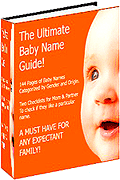Most Popular Baby Names - Names and their Meanings
by: Kirsten Hawkins
These are two topics that strike fear in the hearts of all parents: what will happen when my baby starts teething? How will he respond when it’s time to wean him (from the breast)?
Teething
Teething is not a disease, but a condition of growth. It shouldn’t be dreaded, but simply seen as an accomplishment of a healthy, growing child. Most babies begin teething between 6-8 months of age, but as in all children, it may vary wildly. Some babies are known to teethe as early as 2 months or as late as 14 months. Pediatric dentists agree that the longer it takes a baby to teethe, the stronger and healthier the teeth are. Additionally, the later the teeth take to arrive, the later they will fall out and be replaced by permanent teeth.
Teething should not affect nursing in any way, unless your baby begins chomping down on your nipple. While this is painful and one’s natural response would be to yelp, if you can stay calm and remove him from your breast while saying, “No, no!” you will have a much better response and less biting later on.
Some babies will experience fussiness, irritability, increased salivation, and a slightly raised temperature as they teethe. A proactive dose of infant Tylenol will help greatly, especially before bedtime.
Weaning
(continued...)
Mommy & Baby: Teething & Weaning
Page 2
About The Author
Kirsten Hawkins is a baby and parenting expert specializing new mothers and single parent issues. Visit http://www.babyhelp411.com/ for more information on how to raising healthy, happy children.
|
